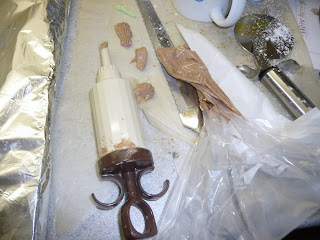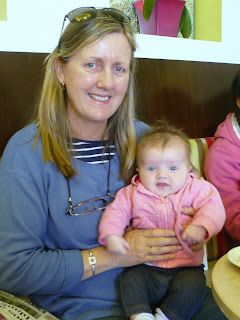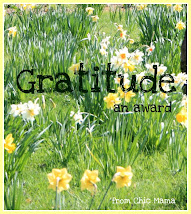 I want to share this lovely double chocolate chip recipe with you as it was the practical element of teen daughter's home economics exam in school today. She has been perfecting it over the past two days with practice runs at home, and as she isn't keen on them herself, the results have been happily consumed by visitors and given to friends. She's not under huge pressure as these are school exams, not the State Junior Cert which she'll sit next year so this is all part of the syllabus for that nerve-wracking event, the first of the two major state exams in Ireland.
I want to share this lovely double chocolate chip recipe with you as it was the practical element of teen daughter's home economics exam in school today. She has been perfecting it over the past two days with practice runs at home, and as she isn't keen on them herself, the results have been happily consumed by visitors and given to friends. She's not under huge pressure as these are school exams, not the State Junior Cert which she'll sit next year so this is all part of the syllabus for that nerve-wracking event, the first of the two major state exams in Ireland.Today I took a dozen of the muffins to work for colleagues to share at the tea break - and while tempting to do so I didn't pass them off as my own, but duly credited the creator. She had to bring all the ingredients to school today, and the practical exam makes up 20% of her marks in home ec. I don't know the origin of the recipe as it's a scruffy dog-eared photocopy, with no identifying title. They are very light and airy, often unusual in muffins which can be very stodgy and heavy, and they are very more-ish.

I was very lucky to get real American chocolate chips some weeks ago from a lovely patient who gets them from a friend in the States. The real thing - here all you can get are small packets that barely do a single batch of cookies or muffins. So that was a lovely gift to get, and they are dark plain chocolate looking like Hershey's Kisses - I used to get those in Bangladesh back in the late '70s when we went to movie nights at the American Center - a place I first tasted Pringles so there are a lot of firsts associated with my time in Dhaka (not least that it's where I first met hubby Jan!)
Enough reminiscing. I am still embedded with strawberries and jam making every evening - as there are about two pounds of the fruit being picked every evening, which ripen fully over the next 24 hours, I have to keep the ball rolling and there are way too many to eat or use for desserts I am making jam - this will be used on cakes and Ice cream and rice pud over the coming months as well as just plain old jam on bread! I have started the great give-away too which benefits friends and neighbours who enjoy my strawberry glut as much as I do.
Double Chocolatete Chip Muffins
Handy Tip: This quantity makes a dozen standard size muffins - use muffin cases rather than cupcake/fairy cake cases as they are slightly bigger, although the latter will do fine if you prefer smaller muffins.
Ingredients
9oz/255g self-raising flour (or plain flour with 2 teaspoons baking powder)
- half-teaspoon bicarbonate of soda (bread soda)
- half-teaspoon salt
- 4-6oz/110-170g white sugar
- 3-5 tablespoons/45-75g unsweetened cocoa powder
- 3oz/85g dark chocolate chips
- 1 egg
- 250ml milk
- 1 teaspoon vanilla essence (or use vanilla sugar*)
- 3oz/85g soft/melted butter
Method
- Preheat oven 190-200 deg. Centigrade/375-400 deg. Fahrenheit
- Sift together flour, cocoa, salt, soda bicarb, baking powder (if using plain flour)
- Add sugar
- Add chocolate chips
- Beat egg, add milk and melted butter
- Add vanilla essence if not using vanilla sugar
- Pour wet ingredients into dry and stir to combine with wooden spoon
- Batter should be lumpy
- Fill muffin cases three-quarters full
- Sprinkle top with chosen topping
- Bake for 20-25 mins until tops spring back when gently pressed
Variations on a theme
- Cherry Chocolate - add 3-4 oz/85-110g chopped glacé cherries (yummy!) to mix
- Hazlenut/Walnut/Brazil/Macadamia/Pecan Chocolate - add 2oz/60g chopped nuts to dry mix
- Mocha Chocolate - add 250ml strong black coffee - cooled - instead of milk
- Orange Chocolate - add 1 teaspoon finely grated orange rind to wet ingredients
- 1 tablespoon (15ml) of each of the following
- Hot melted butter
- Unsweetened cocoa powder
- Hot water
- 4oz/110g icing sugar
- half-teaspoon vanilla essence
Enjoy the muffins with the essential cuppa tea and a relaxing book or favourite telly programme - I'm thinking Desperate Housewives, Gray's Anatomy, Supernanny (so you can feel smug that your kids were never that bad!) or Wife Swap (for exactly the same reasons as Supernanny, adding/substituting hubby/partner for kids!). Now you know what my late night viewing consists of, it seems that standards decline in inverse proportion to the lateness of the hour. My guilty secret, I can justify it if I'm knitting at the same time - how can it possibly be time-wasting then. And we all need down-time, so I won't make any apologies for my relaxation strategies!
The photos are a selection of the finished muffins - a little goes a long way as the chocolate is so rich. The ingredients are also pictured.



















































































